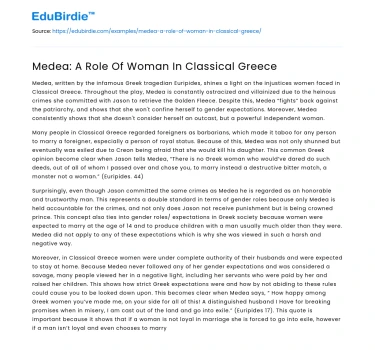Medea, written by the infamous Greek tragedian Euripides, shines a light on the injustices women faced in Classical Greece. Throughout the play, Medea is constantly ostracized and villainized due to the heinous crimes she committed with Jason to retrieve the Golden Fleece. Despite this, Medea “fights” back against the patriarchy, and shows that she won't confine herself to gender expectations. Moreover, Medea consistently shows that she doesn't consider herself an outcast, but a powerful independent woman.
Many people in Classical Greece regarded foreigners as barbarians, which made it taboo for any person to marry a foreigner, especially a person of royal status. Because of this, Medea was not only shunned but eventually was exiled due to Creon being afraid that she would kill his daughter. This common Greek opinion become clear when Jason tells Medea, “There is no Greek woman who would’ve dared do such deeds, out of all of whom I passed over and chose you, to marry instead a destructive bitter match, a monster not a woman.” (Euripides. 44)
Surprisingly, even though Jason committed the same crimes as Medea he is regarded as an honorable and trustworthy man. This represents a double standard in terms of gender roles because only Medea is held accountable for the crimes, and not only does Jason not receive punishment but is being crowned prince. This concept also ties into gender roles/ expectations in Greek society because women were expected to marry at the age of 14 and to produce children with a man usually much older than they were. Medea did not apply to any of these expectations which is why she was viewed in such a harsh and negative way.
Moreover, in Classical Greece women were under complete authority of their husbands and were expected to stay at home. Because Medea never followed any of her gender expectations and was considered a savage, many people viewed her in a negative light, including her servants who were paid by her and raised her children. This shows how strict Greek expectations were and how by not abiding to these rules could cause you to be looked down upon. This becomes clear when Medea says, “ How happy among Greek women you’ve made me, on your side for all of this! A distinguished husband I Have for breaking promises when in misery, I am cast out of the land and go into exile.” (Euripides 17). This quote is important because it shows that if a woman is not loyal in marriage she is forced to go into exile, however if a man isn’t loyal and even chooses to marry another woman there are no consequences.






 Stuck on your essay?
Stuck on your essay?

